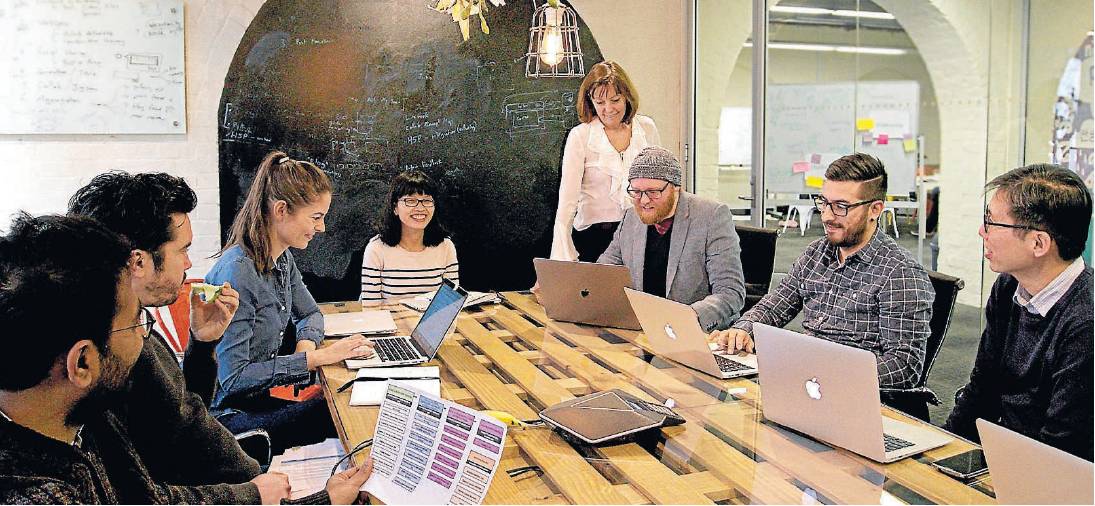Designing world class higher education
Delivering high quality, impactful and lasting online learning experiences has been the elusive goal for higher education providers around the world.
An often overlooked aspect in achieving this is the ‘‘social learning’’ experience – where the learning process is driven by a community of learners and a series of strategically designed learning activities.
This online community interacts, engages, and connects with each other towards achieving knowledge and skill outcomes envisioned within the courses.
According to OpenLearning, an online social learning platform established in 2012, this approach is key to designing world-class online learning experiences.
‘‘Evidence shows that real learning happens when you engage with other learners and collaborate on constructive tasks,’’ says David Collien, chief technology officer at OpenLearning.
With a background in computer science, Collien began his career in education as a tutor at UNSW Sydney before becoming an education PhD researcher specialising in online learning communities, a position Collien left to co-found OpenLearning.
‘‘Collaborating on constructive tasks encompasses creating together, sharing, collaborative editing, peer feedback and roleplaying,’’ he adds.
‘‘These activities enable students to utilise higher order thinking skills such as critical thinking, problem-solving and creativity’’.
These approaches contrast with traditional passive or ‘‘professor-centric’’ learning, where interaction is limited to absorbing and memorising what is being presented.
Even the most common online activities, where one may watch lecture videos and complete quizzes, are not sufficient, says Collien, because the outcomes are usually predetermined, removing any opportunity for discussion or collaboration among students.
Within the higher education space, rising tuition fees and limited scholarships or funding opportunities have led more students to take up online learning.
Online undergraduate and postgraduate degrees are more prevalent and many universities now offer massive open online courses (MOOCs) as a way to promote their university to prospective students around the world.
An emphasis on social learning greatly enhances the educational experience, as the learner is able to engage globally and be exposed to a wide range of perspectives, including with real students from the various institutions of higher education they may be considering.
As such, social learning is able to replicate one of the most important aspects of a bricks-andmortar experience – the people you meet.
While there is a growing movement worldwide towards more interactive online learning experiences, academics who adopt constructive learning methods in their lectures often fall back on passive teaching when translated online.
‘‘A reason this happens is that the educator is often a subject matter expert but may be less familiar with online learning technologies, or how to create meaningful learning experiences online,’’ says Brooke Hahn, OpenLearning’s chief learning officer.
OpenLearning’s service solution is a team of experienced learning designers.
Their role is to collaborate with educators and subject matter experts including university lecturers or professional trainers to collaboratively translate and optimise what they do in a face-to-face environment to an online structure that is most engaging and effective for students.
Hahn adds that the process, which involves a great amount of creativity, ‘‘requires the subject matter experts and learning designers to jointly outline the learning outcomes, get a real sense of who the students are, and really try to connect the concepts to the learners’ world and what interests them.’’
Learning designers are essential in this transitional stage of the social learning movement. Learning design has become more fundamental in recent times as subject matter experts shift from traditional teacher-centred approaches to being facilitators of learning. Hahn says that OpenLearning’s approach to the facilitator role is somewhat different from that of other online providers.
She describes the facilitator as ‘‘not a moderator acting as an authority on what can or cannot be said in discussions, or merely answering questions. Rather, their role is to enhance the experience of the community of learners’’.
This means that the role of facilitator can even be taken on by other learners or students within the program. A multiplier effect happens the more a learner participates online in a social way.
This raises the standard and quality of discourse taking place. The good news for students is that best practices in social learning aligns well with what is expected in today’s techcentric, data-driven, globalised and multi-cultural workplaces.
Collien adds that this constructive approach to education ‘‘yields more than just a course mark. Rather, it creates evidence of how the students are doing and higher order thinking skills they are implementing, and this can be showcased and displayed for others to see’’.
Completed online courses can lead to the creation of a portfolio of work showing competencies and actual experience that would be attractive to prospective employers and facilitate job searches. This approach, according to Collien, sets OpenLearning apart and enables the company to add value to the higher education ecosystem.
‘‘When done well, students become lifelong learners, and potentially, lifelong educators themselves,’’ he says.
Evidence shows that real learning happens when you engage with other learners and collaborate on constructive tasks.
David Collien, of OpenLearning
